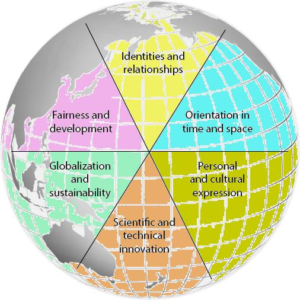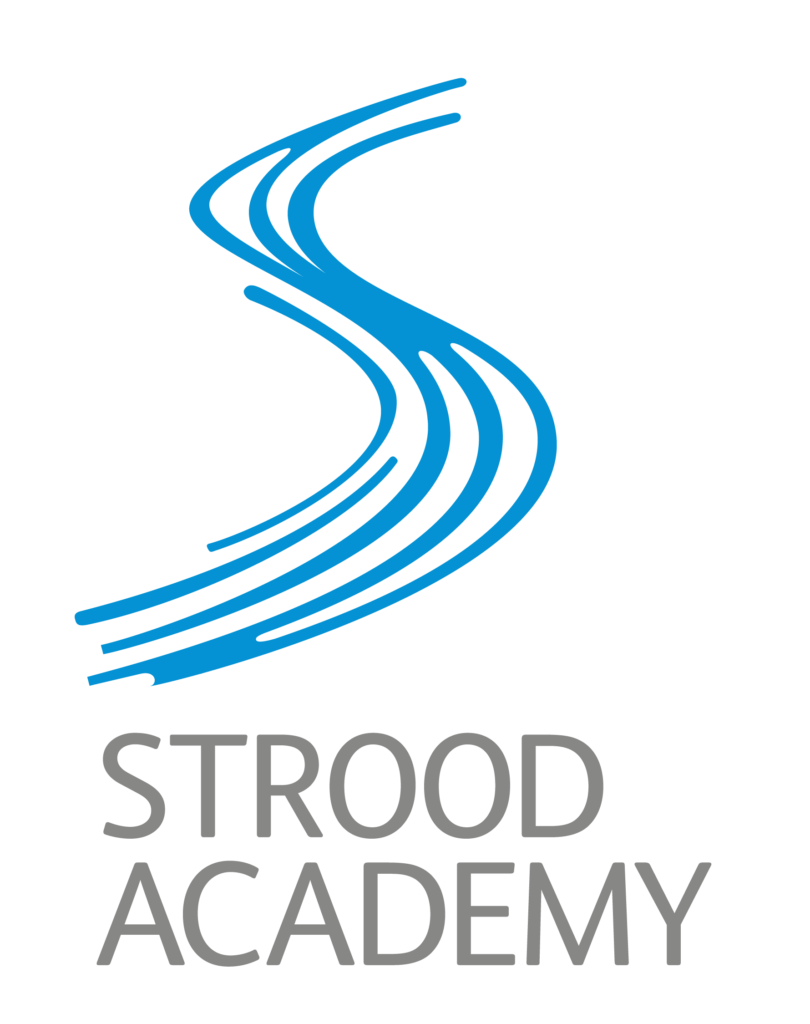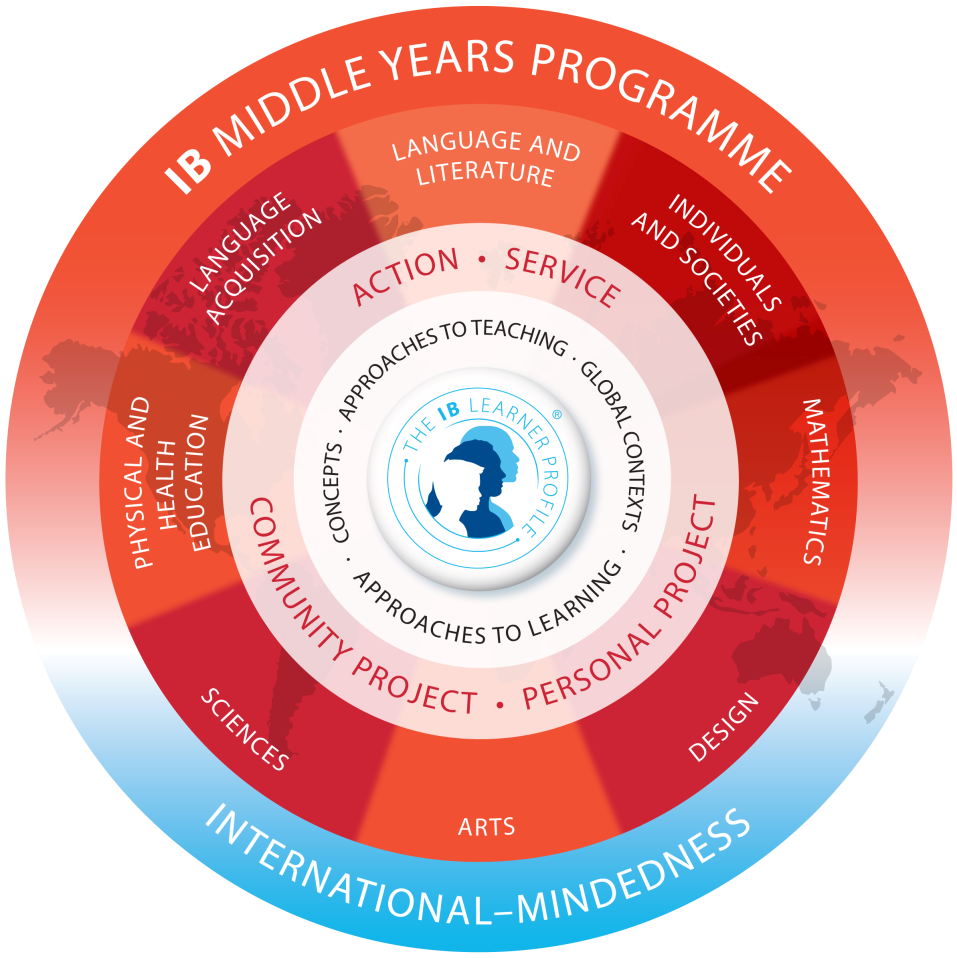Strood Academy is proud to be an IB World School offering the Middle Years Programme programme for Years 7-9 and the IB Careers Programme programme for Years 12 & 13. The MYP is studied by all students in Years 7-9, providing them access to a broad curriculum within 8 different subject groups.
The IB vision states that “The International Baccalaureate® aims to develop inquiring, knowledgeable and caring young people who help to create a better and more peaceful world through intercultural understanding and respect.
To this end the organization works with schools, governments and international organizations to develop challenging programmes of international education and rigorous assessment.
These programmes encourage students across the world to become active, compassionate and lifelong learners who understand that other people, with their differences, can also be right.”
The IB Middle Years Programme provides a framework of academic challenge that encourages students to embrace and understand the connections between traditional subjects and the real world, and to become critical and reflective thinkers. Students are required to study their english and their mother tongue, a second language, humanities, sciences, mathematics, arts, physical education and design.
How is the IB Middle Years Programme Unique?
- We encourage international-mindedness in IB students, starting with a foundation in their own language and culture.
- We encourage a positive attitude to learning by challenging students to solve problems, show creativity and resourcefulness, and participate actively in their communities.
- We reflect real life by providing a framework that allows students to see the connections among the subjects themselves, and between the subjects and real issues.
- We support the development of communication skills to encourage inquiry, understanding, language acquisition, and to allow student reflection and expression.
- Through the learner profile, we emphasize the development of the whole student—physically, intellectually, emotionally and ethically.
MYP Fundamental Concepts
The Middle Years Programme is designed to provide students with the values and opportunities that will enable them to develop sound judgment. The programme is guided by three fundamental concepts that are rooted in the IB mission statement. These concepts are:
- Holistic Learning—representing the notion that all knowledge is interrelated and that the curriculum should cater to the development of the whole person, the attributes of which are described by the IB learner profile. The MYP framework provides links between subject groups and between subject groups and real-world issues. This is accomplished through the the Global Contexts.
- Intercultural awareness—representing the notion that school communities should encourage and promote international-mindedness by engaging with and exploring other cultures, a key feature of international education as reflected in the attributes of the IB learner profile. Students should be encouraged to consider issues from multiple perspectives. Students will develop attitudes, knowledge, concepts and skills as they learn about their own and others’ social, national and ethnic cultures—leading to intercultural awareness, understanding, and respect.
- Communication—representing the notion that schools should encourage open and effective communication, important skills that contribute to international understanding as exemplified by the attributes of the IB learner profile. A communicator is someone who can understand and express ideas and information confidently and creatively in more than one language and in a variety of modes of communication. Since language is the means by which meaning and knowledge are negotiated and constructed, all teachers in the MYP are seen as language teacher
The core skills and attributes run through every aspect of all IB programmes and students will consider the learner profile attributes daily in every lesson as well as through their pastoral, social times, enrichment and extracurricular activities to support their holistic learning and development – physically, intellectually, emotionally and ethically.
As IB learners you will strive to be:

Inquirers

Knowledgeable

Balanced

Caring

Reflective

Principled

Thinker

Risk-Taker

Communicator

Open-Minded
Staff will use deliberate strategies , skills and attributes that will support the IB teaching and learning environment and support the belief that a students education is not only what you learn but it’s how you learn. This in turn will create more effective learners who can apply their knowledge and skills of effective ways for them to learn in their key stage 4 and 5 studies. Students will have opportunities to develop through learning:
- Exchanging thoughts, messages and information effectively through interaction
- Reading, writing and using language to gather and communicate information
- Working effectively with others
- Managing time and tasks effectively
- Managing state of mind
- (Re)considering the process of learning; choosing and using Approaches to Learning skills (reflection)
- Finding, interpreting, judging and creating information
- Interacting with media to use and create ideas and information
- Analysing and evaluating issues and ideas
- Generating novel ideas and considering new perspectives
- Using skills and knowledge in multiple context
Students will study eight curriculum areas within this programme and may have separate areas of study within these for particular subjects. Every subject area comes with a detailed subject guide, unit planner and assessment criteria.
Unit plans are an essential component of the MYP written curriculum. Each subject area will plan units of work throughout the year which will guide the inquiry and assessment within the topic to be studied. There will always be a “statement of inquiry” and inquiry questions in each unit which will underpin the global contexts and key concepts and the reasons/purpose for inquiry and topic to be studied. Content, learning experiences, differentiation and formative assessment will be aspects to be considered that also support challenge for students in each unit of work.
Subjects studied within the IB MYP:
- English Language and Literature
- Language Acquisition
- Mathematics
- Sciences
- Arts
- Design/Technology
- Physical and Health Education
- Individuals and Societies/Humanities
Global Concepts
Global context provides a common language for powerful contextual learning, identifying specific settings, events or circumstances that provide more concrete perspectives for learning. There are six Global Contexts. In their learning, students will be able to see links between subject and real-world issues and global contexts. When selecting global contexts in learning, students will answer the following questions:
- Why are we engaged in this inquiry?
- Why are these concepts important?
- Why is it important for me to understand?
- Why do people care about this topic?
Related Concepts
Related concepts promote deep learning. They are grounded in specific disciplines and are useful for exploring key concepts in greater detail. Inquiry into related concepts will help students develop more complex and sophisticated conceptual understanding within the subject they are studying. Specific related concepts are linked to each subject area of study

Key Concepts
Key concepts promote the development of a broad curriculum. They represent the big ideas that are both relevant within, and across disciplines and subjects. There are 16 key concepts that will be linked as appropriate to topics being taught.
Aesthetics
Change
Communication
Development
Communities
Form
Connection
Creativity
Logic
Culture
Global Interactions
Identify
Perspective
Relationships
Systems
Time, Place and Space
Assessments will take a variety of forms, both formative and summative.
Formative assessments:
A range of formal and informal assessment procedures conducted by teachers during the learning process in order to modify teaching and learning activities to improve student achievement. The goal is to improve/accelerate progress, to improve learning and to help the student become a more independent learner. Examples of formative assessments include: conferencing where a student discusses their work with a teacher, fellow student or another adult, reflection where a student reviews their own work, feedback – WWW (What Went Well) and EBI (Even Better If), teacher observations during a lesson or from completed classwork/ homework.
Summative assessments:
Conducted by teachers are used to evaluate learning at the end of a learning process ie. end of a unit of work. The goal is to provide a final judgement of the learning that has taken place, to identify gaps in knowledge and understanding and to help the student to improve. Examples of summative assessments: tests, examinations, final essay or presentation. This work is usually give a grade or mark.
Teachers collect both formative and summative evidence throughout a unit of work. This helps them to adapt their teaching to meet the needs of students and also assists when reporting to parents, students and other stakeholders.
Each subject group within the MYP has 4 set assessment areas called criteria (A B C D) which are subject specific. This helps students to develop the knowledge and skill they need to be successful in each subject group. These skills are often transferable to other subject groups and aspects of learning. Teachers will assess your child according to each of these criteria at least twice across each year.
ATL 4
4: Exceptional – The student’s work consistently exceeds expectations. The student’s engagement in learning both inside and outside the classroom is to the highest standard.
ATL 3
3: Secure – The student’s work consistently meets and sometimes exceeds expectations. The student’s engagement in learning both inside and outside the classroom is very good.
ATL 2
2: Emerging – The student’s work sometimes meets expectations but improvement is required. The student’s engagement in learning both inside and outside the classroom is varied and requires improvement.
ATL 1
Unsatisfactory – The student’s work is unsatisfactory as it is often incomplete. The student’s engagement in learning both inside and outside the classroom is not allowing them to make sufficient progress.
The MYP assessment process is a criterion-related model. The strengths of this model are:
- Students know before even attempting the work what needs to be done to reach each level.
- It helps teachers to clarify and express their expectations about assignments in a way that students can understand.
- Students are assessed for what they can do, rather than being ranked against each other.
- Students receive feedback on their performance based on the criteria level descriptors.
The MYP has a clear set of assessment criteria for each subject group. Having clear criteria is very helpful as students will know what the learning expectations are for a particular level of achievement before attempting an assignment. As a result, your child will be able to monitor their own progress. The criteria also supports teachers to clarify expectations to students and can shape lessons. Each criterion has eight achievement levels. These are added together to give an achievement level out of a total of 32.
See below for the criteria for each subject.
Criteria A
Analysing
Criteria B
Organising
Criteria C
Producing text
Criteria D
Using language
Criteria A
Listening
Criteria B
Reading
Criteria C
Speaking
Criteria D
Writing
Criteria A
Knowing and understanding
Criteria B
Investigating
Criteria C
Communicating
Criteria D
Thinking critically
Criteria A
Knowing and understanding
Criteria B
Developing skills
Criteria C
Thinking creatively
Criteria D
Responding
Criteria A
Inquiring and analysing
Criteria B
Developing skills
Criteria C
Creating the solution
Criteria D
Evaluating
Criteria A
Knowing and understanding
Criteria B
Investigating patterns
Criteria C
Communicating
Criteria D
Applying mathematics in real-life contexts
Criteria A
Knowing and understanding
Criteria B
Inquiring and designing
Criteria C
Processing and evaluating
Criteria D
Reflecting on the impacts of science
Criteria A
Knowing and understanding
Criteria B
Planning for performance
Criteria C
Applying and performing
Criteria D
Reflecting and improving performance
Criteria A
Disciplinary grounding
Criteria B
Synthesising
Criteria C
Communicating
Criteria D
Reflecting
Converting MYP Achievement Levels Into an MYP Grade
Teachers must gather sufficient evidence from a range of assessment tasks to enable them to make a professional and informed judgement guided by the criteria to determine a student’s achievement level. Achievement levels for the four criteria are added together creating a total number out of 32. Using the table below, this is converted to an MYP Grade from 1-7 with 7 being the highest. This table describes in broad terms what a student can do.
Sum of assessed criteria
MYP grade
Description
28 – 32
7
Produces high-quality, frequently innovative work. Communicates comprehensive, nuanced understanding of concepts and contexts. Consistently demonstrates sophisticated critical and creative thinking. Frequently transfers knowledge and skills with independence and expertise in a variety of complex classroom and real-world situations.
24 – 27
6
Produces high-quality, occasionally innovative work. Communicates extensive understanding of concepts and contexts. Demonstrates critical and creative thinking, frequently with sophistication. Uses knowledge and skills in familiar and unfamiliar classroom and real-world situations, often with independence.
19 – 23
5
Produces generally high-quality work. Communicates secure understanding of concepts and contexts. Demonstrates critical and creative thinking, sometimes with sophistication. Uses knowledge and skills in familiar classroom and real-world situations, and, with support, some unfamiliar real-world situations.
15 – 18
4
Produces good quality work. Communicates basic understanding of most concepts and contexts with few misunderstandings and minor gaps. Often demonstrates basic critical and creative thinking. Uses knowledge and skills with some flexibility in familiar classroom situations, but requires support in unfamiliar situations.
10 – 14
3
Produces work of an acceptable quality. Communicates basic understanding of many concepts and contexts, with occasionally significant misunderstandings or gaps. Begins to demonstrate some basic critical and creative thinking. Is often inflexible in the use of knowledge and skills, requiring support even in familiar classroom situations.
6 – 9
2
Produces work of limited quality. Expresses misunderstandings or significant gaps in understanding for many concepts and contexts. Infrequently demonstrates critical or creative thinking. Generally inflexible in the use of knowledge and skills, infrequently applying knowledge and skills.
1- 5
1
Produces work of very limited quality. Conveys many significant misunderstandings or lacks understanding of most concepts and skills. Very rarely demonstrates critical or creative thinking. Very inflexible, rarely using knowledge or skills.
Parents/carers will receive a report that shows their child’s progress for each subject group at published times during the course of the academic year.
The example below shows the student has a target grade of a 5 for Language and Literature. They are currently working at a grade 4 at the time the Interim report is issued but are on track to achieve the grade 5 by the end of the academic year. Their engagement grade of a 4 demonstrates they are working hard consistently.
Teachers and students will be expected to review and reflect on this and take action to improve.
During the course of the academic year students will be awarded an MYP Interim Grade and at the end of the year a MYP Final Grade will be awarded based on the summative assessments that have taken place during the course of the year.
Example:
MYP Subject Group
Language and Literature (English)
Target
5
Criteria A
5
Criteria B
4
Criteria C
5
Criteria D
5
MYP Interim Grade
5



